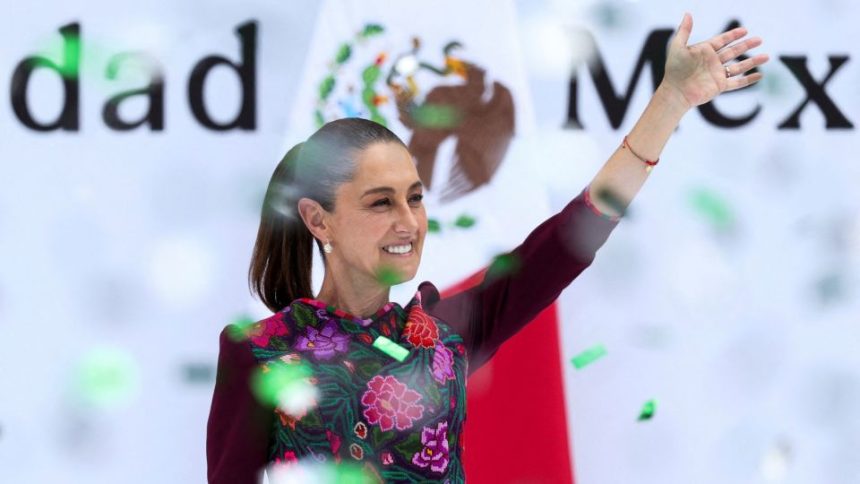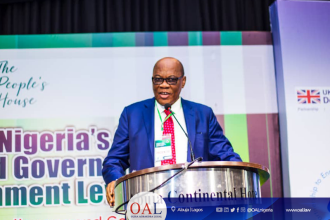One year on from her inauguration as Mexico’s first female president, Claudia Sheinbaum still commands the sort of popular support many leaders can only wish for.
Roughly 70% of Mexicans approve of her performance, according to an August poll by Buendía & Márquez for the newspaper El Universal.
Although that’s down from 80% in February, it’s still a sharp contrast to US President Donald Trump, whose rating is hovering just over 40% eight months into his second term, according to a CNN poll aggregate.
So, what’s the key to Sheinbaum’s success?
Surveys suggest one of her most popular achievements has been the expansion of social support programs for millions of citizens, including seniors, students, single mothers and women in general. These are in part a continuation of the policies that made her predecessor and mentor, former President Andres Manuel Lopez Obrador, so popular and reflect the slogan that swept him into power: “For the good of all, first the poor.”
People gather at Zocalo Square to attend an event marking Mexico’s President Claudia Sheinbaum’s first year in office in Mexico City on Sunday. – Henry Romero/Reuters
Sheinbaum was elected Mexico’s first female president in June, with around 60% of the vote, partly on the back of her promise to continue the legacy of Lopez Obrador.
But since coming to power she has done more than simply follow his agenda.
Analysts point to three other areas that have generated praise for Sheinbaum: her handling of relations with the United States and Trump; her fight against corruption; and the looming soccer World Cup.
A ‘cool head’ with Trump
The Mexican leader has won many plaudits for her measured approach to the US president, including her mantra of keeping a “cool head.”
While Trump has upped the pressure on her with orders that included renaming the Gulf of Mexico as the Gulf of America and declaring drug cartels as terrorist organizations – an act that could pave the way for using American military force on Mexican soil – Sheinbaum has trodden a diplomatic line between cooperating on security and migration while also demanding respect for Mexican sovereignty.

Mexican National Guard officers patrol at a high point of El Nido de las Aguilas in eastern Tijuana, Baja California State, Mexico, on March 5, on the Mexican side of the Mexico-US border. – Guillermo Arias/AFP/Getty Images
Though she has delivered on many of Trump’s demands, such as boosting the number of troops at the US border to deter drug trafficking, receiving thousands of deported migrants from the US, and extraditing dozens of alleged cartel members wanted by the American government, she has also stood strong in the face of his rhetoric.
During a speech Sunday at the iconic El Zócalo square in Mexico City, in which Sheinbaum highlighted a reduction in crime as being among the most important achievements of her first year, she also noted, pointedly, that “Mexico does not accept interference, does not accept interventionism – we are a free, independent and sovereign country.”
Treading that fine line, experts say, has not only helped her international standing, but has also helped her tackle some of the many security problems that have plagued the country for decades.
Fall in crime
In Sheinbaum’s first year, the rate of several high-impact crimes fell sharply, according to official figures.
During the first 11 months of Sheinbaum’s term, 23,917 intentional homicides were recorded in Mexico, down from 31,801 during the first 11 months of López Obrador.
That’s not to say Sheinbaum doesn’t face challenges in this area. That fall in crime has not been even across the entire country.

A truck on fire on the streets of Culiacan, Sinaloa state, in September 2024. Elements of Mexico’s National Guard were deployed amid an escalation of violence that authorities attribute to internal struggles within the Sinaloa cartel following the capture of its leader, Ismael “El Mayo” Zambada. – Ivan Medina/AFP/Getty Images
In the northwestern state of Sinaloa, intentional homicides increased by 400% in the year following the arrest of drug trafficker Ismael “El Mayo” Zambada in July 2024, which triggered clashes between cartel factions that federal security forces have so far been unable to contain.
Moreover, roughly 63.2% of Mexicans say they feel unsafe in their city, according to a report by the National Institute of Statistics and Geography. And most Mexicans believe that security issues are still the country’s top problem, according to multiple surveys.
Fight against corruption
Another area where Sheinbaum has won support is her fight against corruption, particularly the targeting of officials linked to fuel theft, which is a major problem in the country.
Known in Mexico as “fiscal huachicol,” the theft of gasoline and diesel for illegal profit has become a growing source of revenue for criminal groups and is sometimes fueled by government corruption.
In early September, Secretary of Security Omar García Harfuch announced that authorities had arrested 14 people allegedly involved in a large-scale fuel smuggling scheme. Among those arrested were marines, former customs officials and businessmen.
This crackdown is considered a significant development in Sheinbaum’s campaign against corruption and has won the support of 70% of Mexicans, according to a survey by Enkoll for El País newspaper and W Radio, even though many experts liken progress so far to a drop in the ocean.
World Cup, an opportunity to score
While those issues have dominated Sheinbaum’s first year in office, the issue that looks likeliest to dominate her second year is Mexico’s co-hosting of the 2026 soccer World Cup with the United States and Canada.
This will be the third time Mexico has hosted a World Cup – it was the sole host in 1970 and 1986 – and on this occasion it will hold 13 games, including the opening match on June 11.
Both the government and the private sector see an opportunity to attract tourists and income, but they recognize that the country must prepare its infrastructure to receive the visitors who will arrive in the three cities with World Cup stadiums: Mexico City, Guadalajara, and Monterrey.

New turf installed on the field of the Akron stadium, which will be one of the three venues in Mexico for the 2026 FIFA World Cup, near Guadalajara on July 22. – Michelle Freyria/Reuters
There are some other potential pitfalls, too. Some residents of Mexico City wonder if the capital will have the capacity to host the tournament, after this summer saw historic rains that caused multiple floods, collapsed roadways, and affected the operation of the Metro, the city’s main public transportation network. In addition, some anti-gentrification groups have held protests to reject the works related to the World Cup.
Sheinbaum herself has identified the tournament as “a showcase for Mexico,” and will likely receive a further boost to her popularity if she can pull it off smoothly.
This is the first time in history that the tournament is being hosted by three separate countries. Luckily for Sheinbaum, given her skill in handling Trump, she already has a head start when it comes to cooperating with Mexico’s co-hosts.
With reporting from Mauricio Torres
For more CNN news and newsletters create an account at CNN.com









